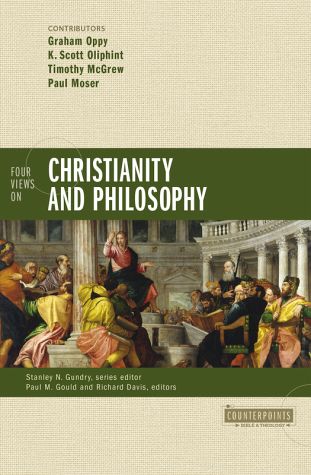Podcast: Play in new window | Download
Subscribe: Spotify | Email | RSS
 “… and hope does not disappoint us, because God’s love has been poured into our hearts through the Holy Spirit that has been given to us.” (Romans 5:5) In the view of Dr. Paul Moser, Christian philosophers have neglected this sort of experience and placed an undue emphasis on arguments. But in his view there is a Christian epistemology in the New Testament, in light of which we can conform our practice of philosophy to divine revelation.
“… and hope does not disappoint us, because God’s love has been poured into our hearts through the Holy Spirit that has been given to us.” (Romans 5:5) In the view of Dr. Paul Moser, Christian philosophers have neglected this sort of experience and placed an undue emphasis on arguments. But in his view there is a Christian epistemology in the New Testament, in light of which we can conform our practice of philosophy to divine revelation.
In Four Views on Christianity and Philosophy (kindle), Dr. Moser dialogues with three other philosophers, two Christians and an atheist. In his view, too many Christian apologists and philosophers adopt the intellectual and moral standards of the world. And he particularly disagrees with the tradition of “natural theology,” the tradition of arguing for the existence of God (or at least of some being inconsistent with naturalism) without reference to divine revelation, using only the reason and experience open to all humans. This pits him particularly against Dr. Timothy McGrew, who we’ll hear from next week.
- Four Views on Christianity and Philosophy (kindle)
- Dr. Moser’s home page
- The Severity of God: Religion & Philosophy Reconceived
- The Elusive God: Reorienting Religious Epistemology
- The Evidence for God: Religious Knowledge Reexamined
- Philosophy After Objectivity
- Knowledge and Evidence
- David W. Forrest, The Authority of Christ, The Christ of History and of Experience
- James Sennett, “Hume’s Stopper and the Natural Theology Project“
- Romans 5:5; 1 Corinthians 8:1; 1 Corinthians 1:18-30; James 3:13-18; John 1:4; John 8:12; Romans 1:18-25; Colossians 2:8; 1 Corinthians 2:6.
- This week’s thinking music is “Lilly….So Far Away” by Fireproof Babies.


I really enjoyed this interview, but I have been reading Paul Moser’s work for a couple years now so I’m already familiar with him. In a nutshell, Moser tries to account for the role of both the human and divine will in inquiry about God. He is very critical of approaches to theology or apologetics that treat God as just another object to examine rather than a supreme person/subject to be known, and by whom one may be known.
Raymond,
Don’t feel bad. I’m not a philosopher either, so this sounded like a lot of rambling to me too.
I appreciate that Rivers.
Dr. Moser spent most of his time warning would-be philosophers about avoiding the pitfalls of intellectualism, but he never discussed his overall perspective on the role or relationship between philosophy and Christianity simpliciter.
Raymond,
Good point.
I’m wary of the philosophical rambling and speculation because I don’t find Jesus and the apostles doing it when they were coming to terms with the implications of the gospel. I don’t think it needs to be so complicated.
Its always interesting, when I have listened to someone speak, or have read some of their written material and I come away with a feeling of not really understanding what has just been communicated to me.- this appears to be one of those times.
After listening to Dr. Moser speak for over 40 minutes, I still don’t have a clear understanding of what his position actually is – concerning the relationship between philosophy and Christianity.
If philosophy is “dogged search for clarity”, then this might not have been achieved in this particular discussion.
Comments are closed.